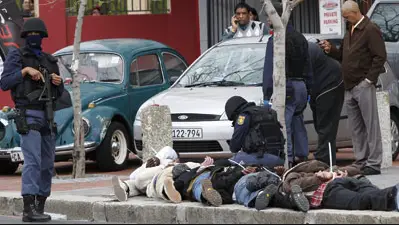The rates of criminal offences like robbery are often seen as an indicator of a country's economic performance, because there are theoretical ties between how wealth is distributed within a population, and the amount of robberies that take place.
The theory is that, the poorer a nation is, the more likely it is to have a high rate of robbery - as people who struggle to fund themselves through legal means, turn to robbery.

However, statistics show that this isn't always the case. For instance, the countries with the lowest GDP (gross domestic product) aren't necessarily the ones with the highest robbery rate.
In fact, developed nations such as the United States, Russia and Italy also have very high crime rates - as does Africa's most economically prosperous nation: South Africa.
However, as aforementioned, economics CAN impact crime rate. Here's how:
- Less government funding means less money for policing
- This in turn encourages criminal gangs to flood an area
- Low income families often have more children and have less time for one on one childcare. This increases the chance of children being born into unstable and almost unethical environments.
- Those who can't afford, take. Especially in this capitalist world where so much weight is put into what we "own" and "have".
Those from deprived background will naturally feel ostracised and unable to compete financially with their peers, and may resort to street robbery.
Robbery does have another tie with economy:
It has been proven that countries with high tourism dependancy also suffer with increases in crimes to the person such as robbery.
This phenomenon is being experienced by South Africa, which is known as a tourist hot spot, but also a notorious and unwanted acknowledgment as being the "rape and carjacking capital of the world".